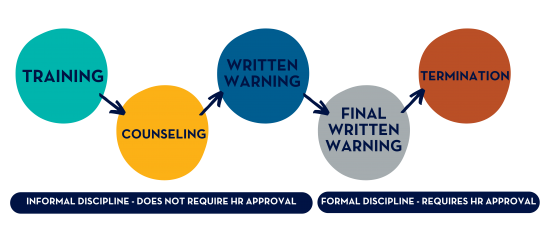Progressive Discipline
Georgia Southern University recognizes that positive discipline is a corrective process designed to give employees the opportunity to overcome work-related shortcomings, strengthen work performance and achieve success while maintaining standards of performance and minimizing disruption to the educational environment and University.
Employees shall perform their assigned duties and responsibilities and obey University and Board policy and the law. The immediate supervisor, unit administrator, and Human Resources will administer appropriate disciplinary action resulting from misconduct by employees. Such action will be fair and consistent and in accordance with established personnel procedures.
Georgia Southern Progressive Discipline Policy #2572

- Orientation
- Job-specific
- Outlines Expectations
Counseling is the ongoing process whereby the supervisor directs the development of the employee through regular performance feedback. If the employee is meeting the supervisor’s expectations, positive feedback can be used to reinforce good performance and influence the employee. Counseling helps you address specific workplace concerns, such as conducting difficult performance evaluations, discussing corrective action with an employee, or managing difficult workplace situations, problems, and conflicts.
Counseling occurs when there are performance problems. The supervisor should use counseling to address performance issues before initiating any corrective action. The supervisor must meet with the employee to clarify the performance expectations and determine what obstacles are impeding the employee’s ability to perform to standard. At this time the position description can be utilized as a tool for looking at job responsibilities. These obstacles might include, for example, a lack of clear instructions, a need for training, a lack of tools/resources, or the impact of another employee’s behavior.
The supervisor’s role is to minimize the barriers to acceptable performance.
In holding a counseling meeting, the supervisor should do the following:
- Before the meeting – review relevant documentation.
- During the meeting – state the problem in terms of expected performance vs. actual performance; allow the employee to respond, and jointly develop a solution.
- After the meeting – document the meeting; and most importantly, follow up.
The counseling meeting should be viewed as developmental rather than punitive. The supervisor should stress that counseling is not part of the corrective action procedure, but that corrective action may result if the employee does not change the job behavior. Written documentation pertaining to the counseling meeting is not kept in the employee’s personnel file but should be kept in the departmental file or a management working file.
- Completed on the DAF (Disciplinary Action Form)
- Expresses desired conduct or performance expectations
- Details consequences
- Where to find help
- Kept at the departmental level
- Requires HR approval prior to issuance
- Completed on the DAF (Disciplinary Action Form)
- Serves as a final call to attention
- Includes history (counseling, written, etc.)
- Serves the same functions listed above for Written Warning
- Goes to Human Resources file with all supporting documentation
- May also opt for suspension or demotion (although rarely used)
- Termination is APPEALABLE!
- Must be authorized by the AVP of Human Resources/ the Office of Legal Affairs
- Disciplinary Action Form (DAF)
- Student/Temp Disciplinary Action Form
- Progressive Discipline Policy
- Further Guidance can be requested HERE
Last updated: 12/5/2023
